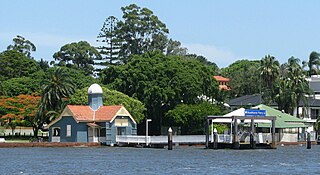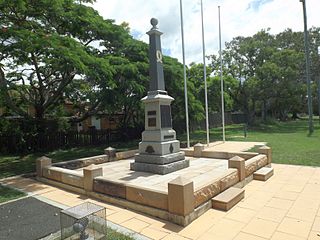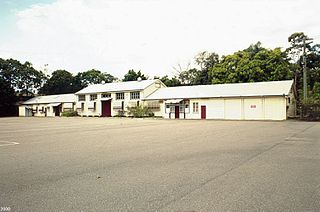
Brisbane Showgrounds is located at 600 Gregory Terrace, Bowen Hills, Brisbane, Queensland, Australia and was established in 1875. It hosts more than 250 events each year, with the largest being the Royal Queensland Show (Ekka).

Bulimba ferry wharf is a heritage-listed ferry wharf at Oxford Street, Bulimba, City of Brisbane, Queensland, Australia. It is located on the southern side of the Brisbane River serving the Brisbane suburb of Bulimba. It is served by RiverCity Ferries' CityCat service and the Cross River service to Teneriffe. It was designed by GHM Addison and Son and built in 1922 by E Taylor. It is also known as Bulimba ferry house and Bulimba waiting shed & landing. It was added to the Queensland Heritage Register on 12 January 2003.

Hawthorne ferry wharf is a heritage-listed ferry wharf located on the southern side of the Brisbane River serving the Brisbane suburb of Hawthorne in Queensland, Australia. It is served by RiverCity Ferries' CityCat services. It was added to the Queensland Heritage Register in 2003.

Holman Street ferry wharf is a heritage-listed ferry wharf located on the southern side of the Brisbane River in Kangaroo Point, City of Brisbane, Queensland, Australia. It is served by RiverCity Ferries' CityHopper and the Cross River service to Riverside wharf. It was added to the Queensland Heritage Register in 2004.

Yeronga Memorial Park is a heritage-listed park at Ipswich Road, Yeronga, City of Brisbane, Queensland, Australia. The park has an area of 224,600 square metres (2,418,000 sq ft) and is one of the oldest in Brisbane, having been established in 1882, and has been a World War I memorial since 1917. It was added to the Queensland Heritage Register on 2 December 2005.

Bulimba is a suburb in the City of Brisbane, Queensland, Australia. In the 2016 census, Bulimba had a population of 6,843 people.

Toowoomba railway station is a heritage-listed railway station on the Western line at Russell Street, Toowoomba, Toowoomba Region, Queensland, Australia. It serves the city of Toowoomba, which is the junction for the Western, Main and Southern lines. The station has one platform with a passing loop, opening in 1867. It was designed by FDG Stanley and built in 1873 by R. Godsall. It was added to the Queensland Heritage Register on 21 October 1992.

St Agnes Anglican Church is a heritage-listed churchyard at Ipswich Street, Esk, Somerset Region, Queensland, Australia. It was designed by John Hingeston Buckeridge and built in 1889 by Lars Andersen. It is also known as St Agnes Rectory and Church Hall. It was added to the Queensland Heritage Register on 21 October 1992.

University of Queensland Gatton Campus is a heritage-listed university campus of the University of Queensland at Warrego Highway, Lawes, Gatton, Lockyer Valley Region, Queensland, Australia. It was built from 1897 to 1960s. It is also known as the Queensland Agricultural College, the Foundation Precinct Gatton College and Lawes Campus. It was added to the Queensland Heritage Register on 6 January 2004.

St John the Baptist Anglican Church is a heritage-listed church at 171 Oxford Street, Bulimba, Brisbane, Queensland, Australia. It was designed by John Hingeston Buckeridge and built in 1888 by T Whitty. It was added to the Queensland Heritage Register on 9 July 2003.

Graceville Memorial Park is a heritage-listed park at 173 Oxley Road, Graceville, City of Brisbane, Queensland, Australia. It was established in 1904. It is also known as Graceville Recreation Reserve and the Sherwood War Memorial. It was added to the Queensland Heritage Register on 5 September 2006.

Mowbray Park and East Brisbane War Memorial are a heritage-listed park and monument within the park on Lytton Road, East Brisbane, Queensland, Australia. It was built from 1904 to 1974. It is also known as East Brisbane War Memorial and Riversdale. It was added to the Queensland Heritage Register on 21 October 1992.

Sinnamon Farm is a heritage-listed farm at 645 & 693 Seventeen Mile Rocks Road, Sinnamon Park, City of Brisbane, Queensland, Australia. It was built from 1869 to 1890s. It is also known as Avondale & Macleod aviation site, Beechwood, Glen Ross, and Seventeen Mile Rocks School. It was added to the Queensland Heritage Register on 21 October 1992.

Gona Barracks is a heritage-listed barracks at 3, 7,12, 25 & 26 Gona Parade, Kelvin Grove, City of Brisbane, Queensland, Australia. It was built from c. 1914 to 1960s. It is also known as Kelvin Grove Military Reserve and Kelvin Grove Training Area. It was added to the Queensland Heritage Register on 7 February 2005.

CSR Refinery is a heritage-listed former refinery at Lamington Street, New Farm, City of Brisbane, Queensland, Australia. It was built from 1892 to 1893. It is also known as Colonial Sugar Refining Company Refinery of New Farm. It was added to the Queensland Heritage Register on 21 October 1992.

Warwick railway station is a heritage-listed railway station on the Southern railway line in Warwick, Southern Downs Region, Queensland, Australia. It was built from c. 1881 to 1910s. It was added to the Queensland Heritage Register on 24 September 1999.

Queens Park is a heritage-listed botanic garden and park at Milford Street, Ipswich, City of Ipswich, Queensland, Australia. It was built from c. 1864 to 1960s. It was added to the Queensland Heritage Register on 27 September 2002.

Toogoolawah War Memorial is a heritage-listed memorial within McConnel Park at Cressbrook Street, Toogoolawah, Somerset Region, Queensland, Australia. The park was built c. 1906 by Frank Williams & Co. It is also known as McConnel Park. It was added to the Queensland Heritage Register on 21 October 1992.

Montville Memorial Precinct is a heritage-listed memorial precinct at Razorback Road and Main Street, Montville, Sunshine Coast Region, Queensland, Australia. It was added to the Queensland Heritage Register on 28 August 2008.

Townsville Showground is a heritage-listed showground at 72-104 Ingham Road, West End, City of Townsville, Queensland, Australia. It was added to the Queensland Heritage Register on 16 October 2008.
























